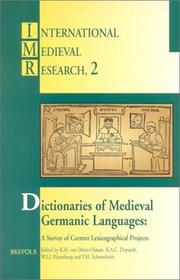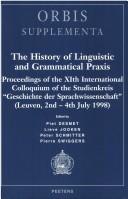| Listing 1 - 10 of 20 | << page >> |
Sort by
|
Book
ISBN: 3860576593 Year: 2002 Publisher: Tübingen : Stauffenburg,
Abstract | Keywords | Export | Availability | Bookmark
 Loading...
Loading...Choose an application
- Reference Manager
- EndNote
- RefWorks (Direct export to RefWorks)
Book
ISBN: 9783823366041 3823366041 Year: 2010 Publisher: Tübingen : Narr,
Abstract | Keywords | Export | Availability | Bookmark
 Loading...
Loading...Choose an application
- Reference Manager
- EndNote
- RefWorks (Direct export to RefWorks)
Book
ISBN: 904200262X Year: 1997 Volume: 47 Publisher: Amsterdam : Rodopi,
Abstract | Keywords | Export | Availability | Bookmark
 Loading...
Loading...Choose an application
- Reference Manager
- EndNote
- RefWorks (Direct export to RefWorks)
Dutch language --- Historical linguistics --- anno 1200-1499 --- Germany --- Dutch literature --- To 1500 --- Appreciation

ISBN: 9042015802 9004486003 Year: 2002 Volume: 226 Publisher: Amsterdam New York Rodopi
Abstract | Keywords | Export | Availability | Bookmark
 Loading...
Loading...Choose an application
- Reference Manager
- EndNote
- RefWorks (Direct export to RefWorks)
French language --- Historical linguistics --- Rickard, Peter (1922-....) --- Français (langue) --- Histoire
Multi
ISBN: 9781107706422 9781107068926 9781107680463 Year: 2016 Publisher: Cambridge Cambridge University Press
Abstract | Keywords | Export | Availability | Bookmark
 Loading...
Loading...Choose an application
- Reference Manager
- EndNote
- RefWorks (Direct export to RefWorks)
"Oscan was spoken in Southern Italy in the second half of the first millennium BC. Here, for the first time, all the evidence for the spelling of Oscan in the Greek alphabet is collected and examined. Understanding the orthography of these inscriptions has far-reaching implications for the historical phonology and morphology of Oscan and the Italic languages (for example providing unique evidence for the reconstruction of the genitive plural). A striking discovery is the lack of a standardised orthography for Oscan in the Greek alphabet, which seriously problematises attempts to date inscriptions by assuming the consistent chronological development of spelling features. There are also intriguing insights into the linguistic situation in South Italy. Rather than a separate community of Oscan-speakers who had adopted and subsequently adapted the Greek alphabet in isolation, we should posit groups who were in touch with contemporary developments in Greek orthography due to widespread Greek-Oscan bilingualism"--
Historical linguistics --- Romance languages --- Manuscripts. Epigraphy. Paleography --- Oscan language --- Inscriptions, Oscan --- Osque (Langue) --- Inscriptions osques --- Orthography and spelling. --- History. --- Orthographe --- Histoire
Book
ISBN: 9783110310726 9783110313468 3110310724 3110313464 Year: 2013 Volume: 550 Publisher: Berlin ; Boston De Gruyter
Abstract | Keywords | Export | Availability | Bookmark
 Loading...
Loading...Choose an application
- Reference Manager
- EndNote
- RefWorks (Direct export to RefWorks)
Die in diesem Band versammelten Beiträge wenden das aus der kontrastiven Linguistik stammende Konzept des Sprachvergleichs auf die Diachronie an. Ziel ist, dadurch Aussagen zum Sprachwandel zu treffen, die über die Einzelsprache hinausgehende Generalisierungen erlauben. Auch erscheint eine Wandelerscheinung einer bestimmten Sprache vor der Folie vergleichbarer Entwicklungen schärfer konturiert; der Ansatz ermöglicht es somit auch, das Sprachspezifische einer Entwicklung zu erkennen. Sowohl der Vergleich verwandter als auch nicht (näher) verwandter Sprachen erweist sich dabei als lohnend. Beim Vergleich nahe verwandter Sprachsysteme ist die Frage zentral, weshalb sich eine bestimmte Sprache trotz identischer Ausgangslage anders entwickelt hat als die mit ihr nahe verwandte(n) Sprache(n); beim Vergleich nicht näher miteinander verwandter Systeme stellt sich dagegen die Frage, ob Verschiedenheiten in der Entwicklung für die jeweilige Sprachfamilie spezifisch sind. Die Beiträge unternehmen Sprachwandelvergleiche für phonologische, morphologische und syntaktische Phänomene. Die untersuchten Daten stammen v.a. aus der (diachron besonders gut belegten) indogermanischen Familie, daneben werden auch seltener betrachtete Sprachen abgedeckt.
Historical linguistics --- Comparative linguistics --- Linguistic change. --- Language and language --- Grammar, Comparative and general. --- Variation. --- Language and languages --- Comparative grammar --- Grammar --- Grammar, Philosophical --- Grammar, Universal --- Philosophical grammar --- Linguistics --- Philology --- Characterology of speech --- Language diversity --- Language subsystems --- Language variation --- Linguistic diversity --- Variation in language --- Change, Linguistic --- Language change --- Grammar, Comparative --- Historical linguistics. --- comparative linguistics. --- language change. --- language contact.

ISBN: 2503506011 Year: 1997 Volume: 2 Publisher: Turnhout : Brepols,
Abstract | Keywords | Export | Availability | Bookmark
 Loading...
Loading...Choose an application
- Reference Manager
- EndNote
- RefWorks (Direct export to RefWorks)
801.3 --- Germanic languages --- -Historical linguistics --- Middle Ages --- #GOSA:XI.ME.M --- #GOSA:XIII.Lex --- Dark Ages --- History, Medieval --- Medieval history --- Medieval period --- World history, Medieval --- World history --- Civilization, Medieval --- Medievalism --- Renaissance --- Diachronic linguistics --- Dynamic linguistics --- Evolutionary linguistics --- Language and languages --- Language and history --- Linguistics --- Teutonic languages --- Indo-European languages --- Lexicografie. Woordenboeken --- Lexicography --- History --- 801.3 Lexicografie. Woordenboeken --- Historical linguistics --- Dictionaries
Periodical
ISSN: 15699781 03025160 Publisher: Amsterdam : Benjamins,
Abstract | Keywords | Export | Availability | Bookmark
 Loading...
Loading...Choose an application
- Reference Manager
- EndNote
- RefWorks (Direct export to RefWorks)
Historiographia Linguistica (HL) serves the ever growing community of scholars interested in the history of the sciences concerned with language such as linguistics, philology, anthropology, sociology, pedagogy, psychology, neurology, and other disciplines. Central objectives of HL are the critical presentation of the origin and development of particular ideas, concepts, methods, schools of thought or trends, and the discussion of the methodological and philosophical foundations of a historiography of the language sciences, including its relationship with the history and philosophy of science. HL is published in 3 issues per year of about 450 pages altogether. Each volume contains a dozen articles or more, at least one review article or a bibliography devoted to a particular topic, a great number of reviews and review notes as well as information on important recent or forthcoming activities and events in the field.
Linguistics --- Taalwetenschap. --- Linguistique --- Linguistics. --- History --- Histoire --- Linguistic science --- Science of language --- Language and languages --- E-journals --- Periodicals --- Historical linguistics --- Arts and Humanities --- Social Sciences --- Language & Linguistics --- Anthropology --- Périodiques --- Histoire. --- Research --- Research.

ISBN: 904290884X Year: 2000 Volume: 14 Publisher: Leuven : Peeters,
Abstract | Keywords | Export | Availability | Bookmark
 Loading...
Loading...Choose an application
- Reference Manager
- EndNote
- RefWorks (Direct export to RefWorks)
Historical linguistics --- Grammar --- Colloques --- Colloquia --- Geschiedenis --- Grammaire --- Grammatica --- Histoire --- Linguistique --- Taalkunde --- 800 --- Linguistics --- -Academic collection --- Linguistic science --- Science of language --- Language and languages --- Taalwetenschap. Taalkunde. Linguistiek --- History --- 800 Taalwetenschap. Taalkunde. Linguistiek --- Academic collection
Book
ISBN: 9783825359409 3825359409 Year: 2012 Volume: 168 Publisher: Heidelberg Universitätsverlag Winter
Abstract | Keywords | Export | Availability | Bookmark
 Loading...
Loading...Choose an application
- Reference Manager
- EndNote
- RefWorks (Direct export to RefWorks)
La langue latine est consideree comme le moyen d'expression de la science europeenne jusquau XVIIIe siecle et meme au-dele. Ce volume, issu des travaux d'un atelier franco-allemand tenu en janvier 2009 a la Sorbonne, veut montrer la diversite des pratiques linguistiques dans la diffusion des sciences au Moyen Age et proposer des reflexions sur la place des langues vernaculaires: outre la traduction et des transferts qu'elle suppose et la question du bilinguisme medieval dans les differentes aires linguistiques, les chercheurs, français, allemands et italiens, montrent comment se constitue une terminologie au Moyen Age avec des phenomenes de contamination entre les langues, qu'il s'agisse du grec, du latin, de l'arabe et de l'hebreu, ou des langues romanes (français, occitan, catalan, italien). Les langues vernaculaires sont donc des supports de science et il s'agit d'envisager leur place et leur fonction dans la diffusion savante en fonction de leurs usages : vulgarisation, communication de praticiens ou langue de reflexion et de creation? Le bilinguisme des litterati favorise-t-il un accas au savoir par une reproduction du latin ou une autonomie de la langue vernaculaire? L'ecriture de la science devient ainsi l'affaire des clercs qui ecrivent en français: quelles modalites utiliser? Existe-t-il des formes propres au discours savant dans cette langue? C'est la naissance d'une langue scientifique plurielle dans l'Europe du Moyen Age a laquelle ces recherches permettent d'assister.
Langues --- Sciences --- Bilinguisme --- Sciences médiévales --- Mots et locutions --- Historical linguistics --- Science and civilization --- Science --- Acculturation --- Langage --- History --- Language --- 001.4 --- 5/6 (09) --- Wetenschappelijke vaktaal. Terminologie. Nomenclatuur --- Geschiedenis van de exacte en toegepaste wetenschappen --- Conferences - Meetings --- 001.4 Wetenschappelijke vaktaal. Terminologie. Nomenclatuur --- Sciences et civilisation --- Historical linguistics. --- Acculturation. --- Langage et langues --- Histoire --- Natural science --- Science of science --- Civilization and science --- History and science --- Science and history --- Science and society --- Progress --- Diachronic linguistics --- Dynamic linguistics --- Evolutionary linguistics --- Language and languages --- Language and history --- Linguistics --- Culture contact --- Development education --- Civilization --- Culture --- Ethnology --- Assimilation (Sociology) --- Cultural fusion --- Pure sciences. Natural sciences (general) --- anno 500-1499 --- Locutions --- Natural sciences --- Sciences médiévales. --- Language. --- Culture contact (Acculturation)
| Listing 1 - 10 of 20 | << page >> |
Sort by
|

 Search
Search Feedback
Feedback About UniCat
About UniCat  Help
Help News
News